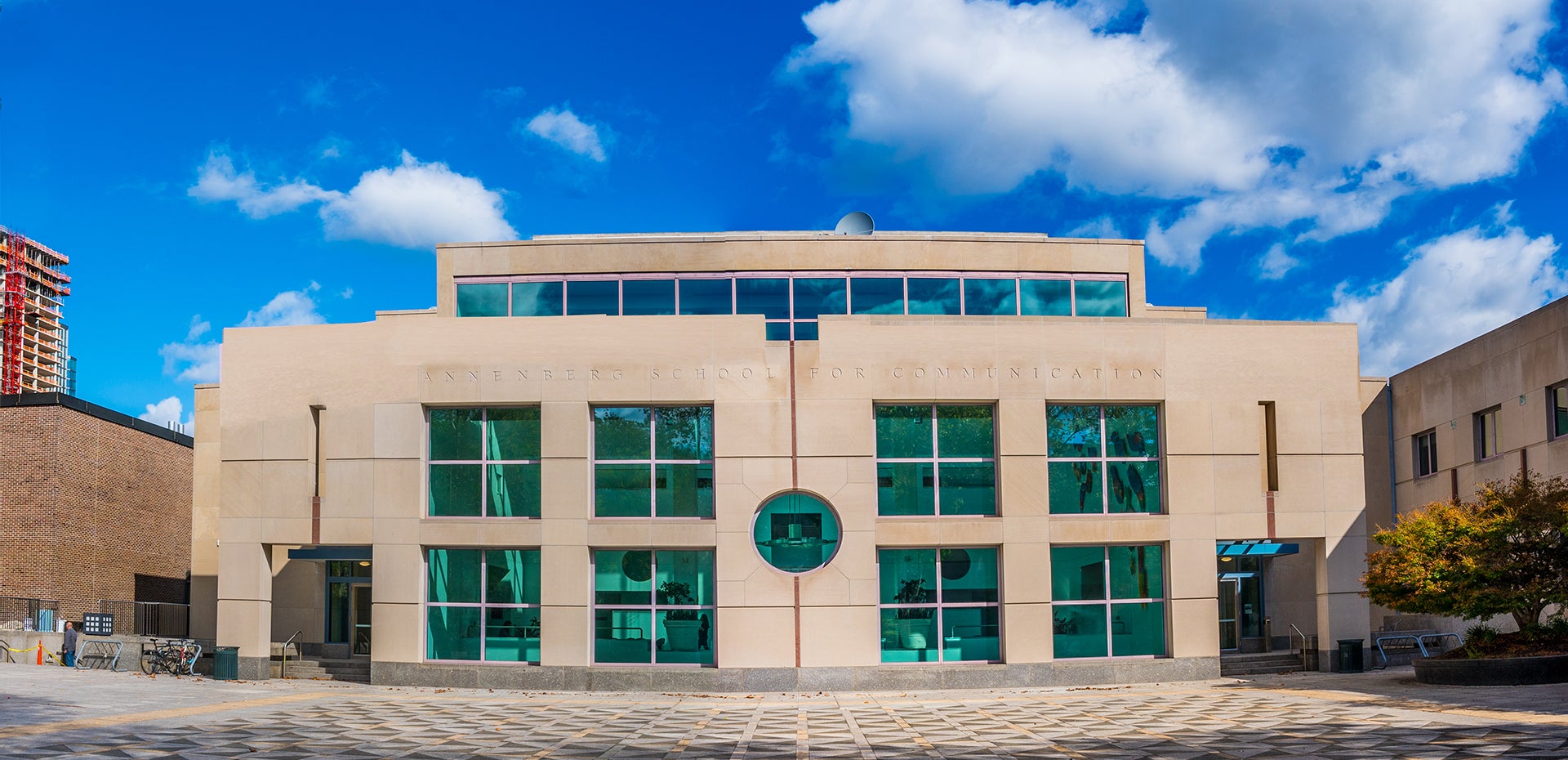Category
All Categories Alumni Call for Submissions Faculty News Graduate Student News In Memoriam News Presentations Research Undergraduate News
Research Area
All Areas Culture & Media Global Communication Health Communication Media Institutions Political Communication Science Communication Technology & Society
Center or Group
All Centers & Groups Addiction, Health, & Adolescence (AHA!) Lab Annenberg Center for Collaborative Communication Annenberg Creative Annenberg Public Policy Center Annenberg School for Communication Library Archives Annenberg Virtual Reality ColLABorative CAMRA Center for Advanced Research in Global Communication Center for Experimental Ethnography Center for Information Networks and Democracy Center for Media at Risk Center on Digital Culture and Society Communication Neuroscience Lab COMPASS Computational Social Science Lab Executive Program in Digital Media for Social Impact Health Communication & Equity Lab Institute for Public Service Institute for the Study of Citizens and Politics Media, Inequality & Change Center Milton Wolf Seminar on Media and Diplomacy Network Dynamics Group Peace and Conflict Neuroscience Lab Polarization Research Lab SAFELab Social Action Lab
Person
All People Adetobi Moses Albert R. Hunt Alex Tolkin Alon P. Kraitzman, Ph.D. Alvin Zhou, Ph.D. Alyssa (Allie) Sinclair, Ph.D. Amitanshu Das Anastasiya Miazhevich Andrew A. Strasser, Ph.D. Andrew Williams Andy Tan, Ph.D., M.P.H., M.B.A., M.B.B.S. Anjali DasSarma Anna Gamarnik Anthony Resnick Areli Rocha Ariel Schwartz, Ph.D. Arlene C. Fernández Arthur Z. Wang, Ph.D. Assil Frayha Aswin Punathambekar, Ph.D. Aviv Landau, Ph.D., M.S.W. Azsaneé Truss Baird Howland Barbie Zelizer, Ph.D. Ben Muzekari Benjamin Todd Jealous Bianca Zamora Perez Billy Pierce Bita Fayaz-Farkhad, Ph.D. Brendan Mahoney, Ph.D. Brittany Zulkiewicz Calvin Isch Cameron Moy Carlin Romano, J.D. Carolyn Marvin, Ph.D. Cerianne Robertson, Ph.D. Chloe (Jae-Kyung) Ahn Christiana Dillard Christine Phan Christopher Muhawe, J.S.D. Cienna Davis Collin Kather Craig Snyder Damon Centola, Ph.D. Damon J. Phillips, Ph.D. Dan Romer, Ph.D. Dan Romer, Ph.D. Danaë Metaxa, Ph.D. Daniel J. Hopkins, Ph.D. Danielle Bassett, Ph.D. Danielle Clark Danielle Cosme, Ph.D. David Eisenhower, J.D. David Grazian, Ph.D. David Lydon-Staley, Ph.D. David S. Cordero Deen Freelon, Ph.D. Desmond Upton Patton, M.S.W., Ph.D. Devo Probol Diana C. Mutz, Ph.D. Diego A. Reinero, Ph.D. Dolores Albarracín, Ph.D. Duncan J. Watts, Ph.D. Dwayne Booth Elaine Hanby Emilie Grybos Emily Falk, Ph.D. Emily Hund, Ph.D. Ennuri Jo, Ph.D. Eran Ben-Porath, Ph.D. Erin Walk, Ph.D. Eszter Zimanyi, Ph.D. Eszter Zimanyi, Ph.D. Eszter Zimanyi, Ph.D. Eugene Kiely Farrah Rahaman Feng Yi Chew Gayoung Jeon Guobin Yang, Ph.D. Hendrik Theine, Ph.D. Hogeun Lee Ify Okpali Ingrid Burrington Irteza Anwara Mohyuddin, Ph.D. Javier Garcia-Perez, Ph.D. Javier Granados Samayoa, Ph.D. Jeanna Sybert, Ph.D. Jeesung Ahn Jeff Pooley, Ph.D. Jennifer Rothman Jenny Lee Jessa Lingel, Ph.D. Jessica McDonald Jiaxi Wu, Ph.D. John B. Jemmott III, Ph.D. John Cheney-Lippold, Ph.D John Cheney-Lippold, Ph.D. John L. Jackson, Jr., Ph.D. José Carreras-Tartak Joseph N. Cappella, Ph.D. Joseph Turow, Ph.D. Juan Llamas-Rodriguez, Ph.D. Julia Cope Julia Ticona, Ph.D. Julian Quiros, Ph.D. Kallahan V. Brown Kate Okker-Edging Katerina Girginova, Ph.D. Kathleen Hall Jamieson, Ph.D. Katie Rawson, Ph.D. Ken Winneg, Ph.D. Ken Winneg, Ph.D. Kevin B. Johnson, M.D. Kim Woolf, Ph.D. Kinjal Dave Kirsten O. Lydic Kyle Cassidy Laetitia Mwilambwe-Tshilobo Lauren Tokos Leah Seppanen Anderson, Ph.D. Lia Howard, Ph.D. Litty Paxton, Ph.D. Liz Hallgren Lizzie Martin Louisa Lincoln Lucila Rozas Lucy March, Ph.D. Malav Kanuga, Ph.D. Man-pui Sally Chan, Ph.D. Mariela Morales Suárez Marjorie Margolies Marta R. Durantini, Ph.D. Matt Parker, Ph.D. Matthew Brook O'Donnell, Ph.D. Matthew L. Conaty Matthew Levendusky, Ph.D. Maya Enisman, Ph.D. Melissa B. Skolnick-Noguera, Ph.D. Mengyang Zhao Michael E. Mann, Ph.D. Michael X. Delli Carpini, Ph.D. Minjae Seo, Ph.D. Monroe Price, J.D. Moya Bailey, Ph.D. Murali Balaji, Ph.D. Murali Balaji, Ph.D. Natasha Williams Neil Fasching Nelanthi Hewa, Ph.D. Nicholas Dias Nicole Cooper, Ph.D. Nidah Mohammed Olivia González, Ph.D. Oscar H. Gandy, Jr., Ph.D. Ovidia Stanoi, Ph.D. Patrick E. Jamieson, Ph.D. Qijia Ye R. Lance Holbert, Ph.D. Ran Wang Robert C. Hornik, Ph.D. Robin Wagner-Pacifici, Ph.D. Rosemary Clark-Parsons, Ph.D. Sam Wolken Samantha Dodd Summerbell, C.A. Sandra González-Bailón, Ph.D. Sanjay Jolly Sara Reinis Sarah Banet-Weiser, Ph.D. Sarah J. Jackson, Ph.D. Sarah Ropp, Ph.D. Scott Reich, J.D. Shana Kleiner, L.M.S.W. Shane Sheehy Shawn Patterson Jr., Ph.D. Shengchun Huang Silvia Téliz Sim Gill Sima Kokotović, Ph.D. Siva Mathiyazhagan, Ph.D., M.S.W. Sixiao (Vivian) Liu, Ph.D. Sophie Maddocks, Ph.D. Staci Jones Tara Liss-Mariño, Ph.D. Taurean Butler Taylor L. Smith Tejas Harad Thandi Lyew Thomonique Moore Tian Yang, Ph.D. Timothy Dennys Steven Dorr Tom W. Etienne Tukufu Zuberi, Ph.D. Tyler Leigh Valentina Proust Victor Pickard, Ph.D. Vincent Price, Ph.D. Vishwanath E.V.S. Waldo Aguirre Xi Shen, Ph.D. Xinyi Wang Ying Zhang Yingchuan Qu Yphtach Lelkes, Ph.D. Zane Griffin Talley Cooper Zehra Husain, Ph.D.
Topics
All Topics Activism & Social Justice Attitudes & Persuasion Behavior Change Big Data Data Privacy Digital Culture Film & Mediamaking Gender & Sexuality Gig Economy International Media Journalism Media Effects Media History Media Policy Networks Neuroscience Partisanship & Polarization Peace & Conflict Politics & Elections Public Health Race & Ethnicity Social Media Tobacco & Substance Abuse Visual Communication










